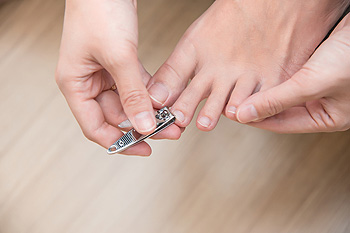(517) 487-5171
Fax (517) 908-0172
What Causes an Ingrown Toenail?
Monday, 11 May 2020 00:00 Toenails that grow into the surrounding skin of the nail bed are referred to as ingrown toenails. This foot condition is known to be incredibly painful and can cause redness and swelling to the toe. In severe cases, some patients may experience a discharge coming from the impacted toe, which is often indicative of an infection. There are several different reasons why an ingrown toenail may develop. Common causes for an ingrown toenail may include tightly fitted footwear, injury to the toe, improper toenail trimming, unusual toenail curvature, and genetic factors. If you believe you have developed an ingrown toenail, it is suggested you speak with a podiatrist to determine the best plan of treatment for you.
Toenails that grow into the surrounding skin of the nail bed are referred to as ingrown toenails. This foot condition is known to be incredibly painful and can cause redness and swelling to the toe. In severe cases, some patients may experience a discharge coming from the impacted toe, which is often indicative of an infection. There are several different reasons why an ingrown toenail may develop. Common causes for an ingrown toenail may include tightly fitted footwear, injury to the toe, improper toenail trimming, unusual toenail curvature, and genetic factors. If you believe you have developed an ingrown toenail, it is suggested you speak with a podiatrist to determine the best plan of treatment for you.
Ingrown toenails may initially present themselves as a minor discomfort, but they may progress into an infection in the skin without proper treatment. For more information about ingrown toenails, contact Dr. Gary Cesar of Michigan Foot and Ankle Center. Our doctor can provide the care you need to keep you pain-free and on your feet.
Ingrown Toenails
Ingrown toenails are caused when the corner or side of a toenail grows into the soft flesh surrounding it. They often result in redness, swelling, pain, and in some cases, infection. This condition typically affects the big toe and may recur if it is not treated properly.
Causes
- Improper toenail trimming
- Genetics
- Improper shoe fitting
- Injury from pedicures or nail picking
- Abnormal gait
- Poor hygiene
You are more likely to develop an ingrown toenail if you are obese, have diabetes, arthritis, or have any fungal infection in your nails. Additionally, people who have foot or toe deformities are at a higher risk of developing an ingrown toenail.
Symptoms
Some symptoms of ingrown toenails are redness, swelling, and pain. In rare cases, there may be a yellowish drainage coming from the nail.
Treatment
Ignoring an ingrown toenail can have serious complications. Infections of the nail border can progress to a deeper soft-tissue infection, which can then turn into a bone infection. You should always speak with your podiatrist if you suspect you have an ingrown toenail, especially if you have diabetes or poor circulation.
If you have any questions, please feel free to contact our offices located in Lansing and Mt. Pleasant, MI . We offer the newest diagnostic and treatment technologies for all your foot care needs.








